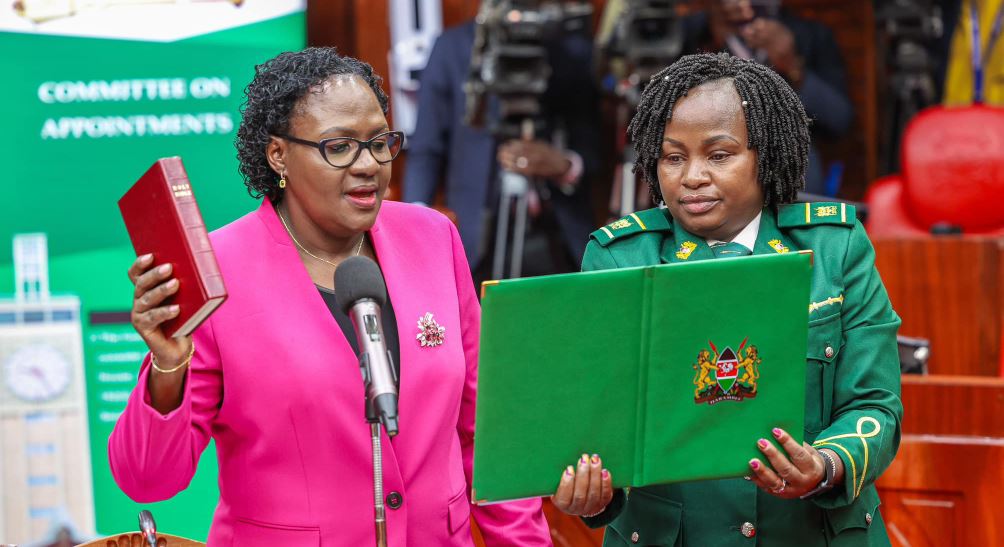
Speaking at State House, Nairobi, on Thursday, Ruto outlined a comprehensive plan to tackle corruption, enhance transparency, and boost Kenya’s economic growth.
“We are at a pivotal moment in our journey,” Ruto remarked, highlighting the urgency of the tasks ahead. “The reconstituted Cabinet will expedite our goals by focusing on several critical areas.”
Among these, the President strongly emphasized accountability and the relentless fight against corruption.
To ensure the responsible use of public resources, Ruto announced plans to introduce new measures.
“We shall introduce measures to levy a surcharge against any accounting officer or public officer who causes a loss of public resources,” he said, underscoring his commitment to holding officials accountable.
Ghost Workers
In a bid to combat payroll fraud, Ruto proposed the implementation of a Unified Personal Identification system across all government levels.
“To eliminate ‘ghost worker’ payroll fraud, we will implement a Unified Personal Identification system for all personnel across every arm of government,” he explained.
This initiative aims to streamline government payrolls and prevent fraudulent activities that drain public funds.
Public Service Vetting
Ruto also addressed the need for stricter vetting procedures for public officials. He announced that the Cabinet will introduce a legal and institutional framework for mandatory and continuous vetting of all public officers. This framework will centralize the management of wealth declarations, ensuring transparency and accountability through a single office.
The President stressed the importance of swift justice in corruption cases. “We will ensure the expeditious investigation and prosecution of all offences related to corruption and economic crimes,” Ruto stated.
This effort will involve updating relevant statutes and guaranteeing that corruption cases are resolved within six months, reflecting the administration’s determination to curb corruption.
Witness Protection
To further bolster the fight against corruption, Ruto committed to strengthening the Witness Protection Act. He emphasized the need to make it easier and safer for citizens and whistle-blowers to report corruption.
“Our fight against corruption will be greatly enhanced by making it easier and safer for citizens and whistle-blowers to report corruption and economic crimes,” Ruto added.
Legislative support also plays a crucial role in Ruto’s plan for transparency. He highlighted his engagement with parliamentary leadership to expedite the enactment of the Conflict of Interests Bill. Ruto expressed his commitment to signing effective legislation into law, reinforcing the government’s stance on integrity and transparency.
Government Expenditure
Public expenditure management is another area slated for reform under Ruto’s leadership. He announced plans to adopt a zero-based budgeting system starting in the Financial Year 2025-2026. “We will reorient the government’s budgeting and expenditure framework,” he said, marking a significant shift towards more efficient use of public funds.
In addition, Ruto advocated for the use of technology as a key tool in reducing corruption. “We shall exploit the power of information and communication technology to radically diminish opportunities for corruption by digitizing procurement and making it open and transparent,” he explained.
VAT Refund
The VAT refund process will also undergo a revamp to enhance transparency. “We will establish a framework to ensure the VAT refund process is open, transparent, and accountable,” Ruto stated, ensuring that businesses receive timely refunds.
Finally, Ruto urged collaboration with parliament to support local industries. “The reconstituted Cabinet will work with parliament to develop measures that promote local manufacturing and job creation by limiting imports of products that can be produced domestically,” he added, emphasizing the need to bolster Kenya’s industrial capacity.
In closing, Ruto reiterated that the Kenya Kwanza agenda, developed over the past two years, focuses on job creation, boosting local industrial capacity, and wealth creation. He urged his Cabinet to expedite the realization of these goals while building on the foundation already established.
“The reconstituted Cabinet will accelerate our progress and build on this solid foundation,” Ruto affirmed, setting the stage for the next phase of his administration’s development agenda.








